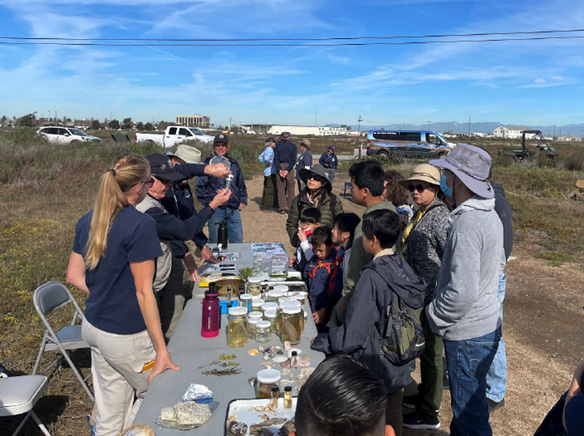
Our most recent “End of Month Tour” on Saturday, Jan. 27, took place on a sun ?lled morning with scenes of majestic birds, cool breezes, and inquisitive smiles on the faces of our visitors, half of whom were Cub Scouts. Time to review their Outdoor Code: As an American, I will do my best to “Be clean in my outdoor manners, Be careful with ?re, Be considerate in the outdoors and Be conservation-minded.”
We face the challenge of providing an engaging morning for our guests when those attending visit for varying reasons and interests. We provide presentations on the science of wetlands, the beauty and uses of plants, a microscopic view into life within the marsh, learning about endangered birds and mammals, and lastly the existential and always present topics dealing with climate change and environmental struggles.
This writer tackles the last topic and when assuming this task several years ago the focus was on plastics in the environment. Over the years the scope has enlarged and now encompasses most aspects of our lives from trash to the food and air we breathe to individual responsibility for protecting our planet.
The faces of the Scouts reached just above the top of the table where this discussion took place. Their eyes were wide, their uniforms impressive, and smiles captivating. While attention spans varied, they were listening and answering questions. One Scout leader and parent asked a question wanting an opinion on what they could do to inspire their children to learn more about these issues facing them as they grow and mature.
The answer does not come easily. Much has been written regarding the contributions of our western culture and ways of living to global warming and its effects. Much has been written concerning the delays in the actual implementation of international agreements attempting to cap the increase in global temperatures. While there has been a marked increase in the debates among politicians, environmentalists, climate scientists and others, there is wrought to do now within our own communities.
Scouts have made their presence known on this wildlife refuge: building bird nesting boxes, homes for owls, trail signage, habitat renewal, recycling center and attendance at end of month tours. To answer the question from the parent and Scout leader, I re?ected upon a quote from a Los Angeles Times editor who wrote, “Yes, you can talk to kids about climate without being bleak.” We can easily fall into negative thinking, so a choice response was “Visit a refuge and enjoy the birds, plants, and other creatures that inhabit our world” and take those memories home. You have already taken a decisive step to help address our environmental stresses. Scouts are taught to “Be clean in outdoor manners…careful with ?re … considerate of outdoor places … conservation minded.” Guide your children as they request to view TV and movies, read stories and books which celebrate nature, consider your purchases of food, travel, and activities. We adults learned from the young Scouts on this beautiful morning as they demonstrated an interest and excitement in nature.
Joe Lazzari is a member of Friends of Seal Beach NatIonal Wildlife Refuge.



